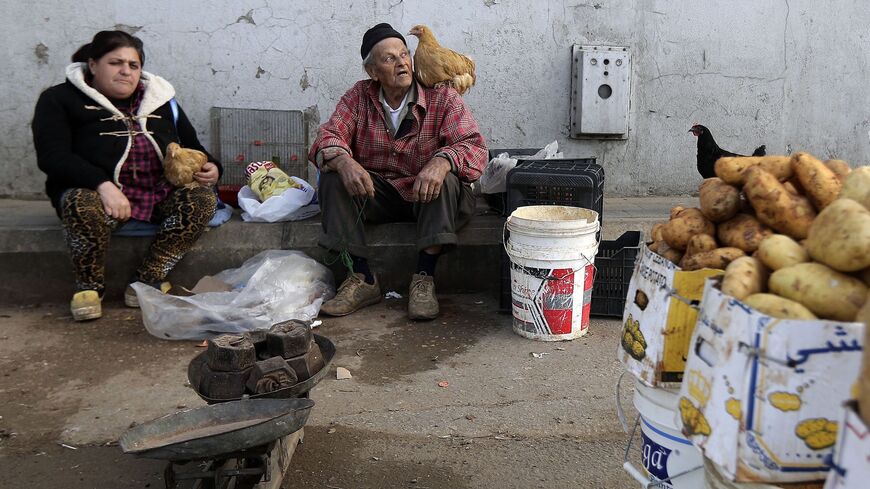
by al-monitor.com — Andrea Lopez-Tomas — BEIRUT, Lebanon — Habeeb and Elham Copti used to have a good life. The Lebanese couple remembers the old days when they could eat meat, afford medications and have the lights on — even send presents to their grandchildren. But those times are over. When Habeeb retired, their income stopped and now, both in their 80s, they are facing poverty and uncertainty in Lebanon’s economic crisis. “There is no pension from the government when you are old like in most countries. No one is helping us so how are we supposed to pay our bills?” asked Habeeb with tears in his eyes. Lebanon is one of the 16 countries in the world that don’t offer social security, according to the International Labor Organization (ILO). The Lebanese Republic is home to the highest number of elders in the region: 11% of its population is over the age of 65. The UN Economic and Social Commission for Western Asia expects that figure to increase to 23.3% by 2050.
Georgette Abou Suleiman worked all her life as a seamstress. “I had lots of orders. I was good at the job,” said the 74-year-old lady from the darkness of her house in Beirut. But 15 years ago, she was diagnosed with Parkinson’s disease and she had to quit. I only survive because people help me,” she added. At 20 years old, Marina el Khawand runs the aid group Medonations, which imports medication and provides it to those in need. “Every time Georgette goes to the pharmacy is a struggle because she is not able to find her medicines,” she told Al-Monitor. Since 2019 Lebanon has been facing one of the world’s worst economic crises. The Lebanese pound has lost 90% of its value. There is a lack of electricity, water, food and medicine as it grows ever more difficult to import goods into the country.
The banking system has crumbled and with it much of the elderly population’s life savings. Many young people are abandoning Lebanon in search of a more dignified life. After the first tough months of the pandemic, the blast in Beirut’s port on Aug. 4, 2020, shattered any hopes of improvement. “After the explosion, my house looked like a war zone. I lost everything,” explained Nadim Bitar, who now lives in a small room provided by Beit el Baraka. Every evening Nadim goes to Mar Mikhael, a vibrant neighborhood full of bars and pubs, and sells bracelets to make ends meet. “I never thought I would be working at 74 but I need to eat,” he told Al-Monitor. Of the Lebanese population above the age of 65, 80% has no health care coverage, according to the ILO. “Few Lebanese get a retirement pension when they are forced to stop working at 65. Those in the public sector get a small income and they have medical coverage,” said Maya Ibrahimchah, the founder of the nongovernmental organization Beit El Baraka, which helps elders around the country. Some workers in the private sector get a final bonus that can sustain them for a few years.
Malakeh Chaddoud started working at the age of six. After six decades taking care of children, she received $4,000 upon retiring. It did not go far. “I had to buy a washing machine for one of my three sons and fix some things in my house,” the 84-year-old told Al-Monitor from her rented room. Ibrahimchah said that around 70 or 72, whatever money Lebanese retirees do have tends to run out. This past year has also hit the Lebanese population psychologically. Mental health has also been severely impacted during the pandemic as self-quarantine and lockdowns have reduced social interaction and increased loneliness among older people in Lebanon. “A system that doesn’t respect these elders is filthy; it goes beyond corruption,” said Ibrahimchah. Beit el Baraka created a supermarketlike aid distribution center for them where a points system is used and real money is not accepted. “It makes them feel like they are buying in an actual supermarket but they don’t have to pay and are not made to feel ashamed about it,” she told Al-Monitor.
Habeeb, Elham, Georgette, Nadim and Malakeh are part of a generation that rebuilt Lebanon. They survived the civil war and put the country back together again, but have never seen times darker than today. “We are living in trauma. Every time there is a storm I get scared because it brings me back to the moment of the explosion,” Elham Copti told Al-Monitor. “They are suffering from PTSD but no one is treating them. They are the most forgotten when it comes to humanitarian aid,” Khawand pointed out. Many organizations are overwhelmed with requests for help as many people are unable to help their parents and grandparents because they are struggling themselves. “We are being asked to play the role of a government, a United Nations, ambassadors and we can’t do that,” said Ibrahimchah. Among the Arab countries, Lebanon’s population is one of the most rapidly aging, according to UN Economic and Social Commission for Western Asia. With the exodus of Lebanese youth and the decrease of fertility combined with improvements in medicine and longer life expectancies, Lebanon is growing older. “All I ask for in the future is that my kids have a good life and they don’t have to suffer through a war,” said Malakeh. Readying to go down to the streets and start working, Nadim was more pessimistic. “There is no future for us, but there is no future for Lebanon either,” he concluded.
Read more: https://www.al-monitor.com/originals/2021/12/lebanons-elderly-population-devastated-crash#ixzz7EPfX2tgS



